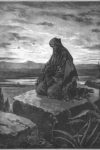From Isaiah 49-53
 Today’s passage is the fourth of the servant songs (Is 42.1-7; 49.1-12; 50.4-11, and 52.13-53:12). This song is particularly well known and describes the servant as the one who suffers. Like many great passages it tells a story.
Today’s passage is the fourth of the servant songs (Is 42.1-7; 49.1-12; 50.4-11, and 52.13-53:12). This song is particularly well known and describes the servant as the one who suffers. Like many great passages it tells a story.
This post is part of my bible in a year series.
Passage and Comments
13 Behold, my servant shall act wisely;
he shall be high and lifted up,
and shall be exalted.
14 As many were astonished at you
his appearance was so marred, beyond human semblance,
and his form beyond that of the children of mankind
15 so shall he sprinkle many nations;
kings shall shut their mouths because of him;
for that which has not been told them they see,
and that which they have not heard they understand. (Is 52.13–15)
These first verses above summarise the highpoint of the whole passage. The servant shall act wisely, he shall be high and lifted up and then exalted.
When people look at him he will be marred (hurt and damaged) beyond recognition. Suggesting he has suffered. He will sprinkle many nations. The term ‘sprinkle’ should remind us of the blood of sacrifices for sin and atonement (Ex 29.21; Lev 4.6,17; 5.9; 16.14). People who hear about him will be silenced. Cryptically, he says they will understand things they did not know before.
53.1 Who has believed what he has heard from us?
And to whom has the arm of the Lord been revealed? (Is 53.1)
Only a select people will understand what has happened. They will know it was the LORD’s doing. Who will believe it? Who will the LORD reveal his action to?
2 For he grew up before him like a young plant,
and like a root out of dry ground;
he had no form or majesty that we should look at him,
and no beauty that we should desire him.
3 He was despised and rejected by men;
a man of sorrows, and acquainted with grief;
and as one from whom men hide their faces
he was despised, and we esteemed him not. (Is 53.2-3)
The author describes his life. He grew up like a young plant, but nothing in his appearance made him attractive. In fact he was despised and rejected. So quite the opposite, at one time all people rejected him and did not understand. He experienced sorrow and grief. In part because we did not understand him for who he was.
4 Surely he has borne our griefs
and carried our sorrows;
yet we esteemed him stricken,
smitten by God, and afflicted.
5 But he was pierced for our transgressions;
he was crushed for our iniquities;
upon him was the chastisement that brought us peace,
and with his wounds we are healed.
6 All we like sheep have gone astray;
we have turned—every one—to his own way;
and the Lord has laid on him
the iniquity of us all. (Is 53.4-6)
But even while we treated him this way, he bore our griefs. Our sorrows, our pains and difficulties. But when he suffered, we considered him cursed by God. He was pierced for our transgressions, our iniquities and sins. We had gone astray and we regarded him not, but he did so much for us while we were in a state of ignorance and rebellion.
7 He was oppressed, and he was afflicted,
yet he opened not his mouth;
like a lamb that is led to the slaughter,
and like a sheep that before its shearers is silent,
so he opened not his mouth.
8 By oppression and judgment he was taken away;
and as for his generation, who considered
that he was cut off out of the land of the living,
stricken for the transgression of my people? (Is 53.7-8)
The author now moves from describing his life to his suffering and death. He suffered quietly. He knew he was going to die, but he didn’t resist. He was oppressed and judged by others. Put to death, cut off from the land of the living. Stricken for others and for their sin. These people who did not know what they were doing.
9 And they made his grave with the wicked
and with a rich man in his death,
although he had done no violence,
and there was no deceit in his mouth.
10 Yet it was the will of the Lord to crush him;
he has put him to grief;
when his soul makes an offering for guilt,
he shall see his offspring; he shall prolong his days;
the will of the Lord shall prosper in his hand. (Is 53.9-10)
The author continues describing what happened to him. He died and they laid him with a rich man in a grave. He reaffirms that it was the LORD’s will to crush him and make him suffer. His soul will make an offering for guilt, for sin. He will have offspring, of a kind. Through his suffering and death, the will of the LORD will prosper. The LORD uses his death to bring atonement and salvation to many who initially did not recognise him for who he was or what he was doing.
11 Out of the anguish of his soul he shall see [MMT he shall see light] and be satisfied;
by his knowledge shall the righteous one, my servant,
make many to be accounted righteous,
and he shall bear their iniquities.
12 Therefore I will divide him a portion with the many,
and he shall divide the spoil with the strong,
because he poured out his soul to death
and was numbered with the transgressors;
yet he bore the sin of many,
and makes intercession for the transgressors. (Is 53.11-12)
The Masoretic Text interestingly has ‘he shall see light’ which alludes to resurrection. If this is true Isaiah is saying after the servant dies, he will be raised to new life. He is righteous himself and by knowledge of him and his suffering, death and resurrection he will be the reason why many others will be counted righteous. Because of this the LORD will reward him greatly, because he was obedient unto death, serving as a sacrifice for the sins of others.
Overall if we look at the stages described in the suffering servants life. The author describes his early life (Is 53.2-3),
his suffering and death (Is 53.7-8),
his burial among the rich (Is 53.9), and completes the story saying
he shall divide the spoil with the strong, he shall see light (be raised from the dead) (Is 53.11).
Story of Israel

This servant song may have been instrumental in developing the Jewish understanding of atonement and sin sacrifices. Writing about Israel, sacrifice and the exile, NT Wright says a bit about Isaiah 53.
“If the exile itself was seen as a ‘death’, and therefore return from exile as a ‘resurrection’, it is not a long step to see the death of Israel as in some sense sacrificial, so that the exile becomes not simply a time when she languishes in Babylon, serving a forlorn sentence in a foreign land, but actually a time through which the sin she has committed is expiated.
The exile, it seems, was to be seen both as a punishment for the nation in its wickedness, and as in some sense a vocation to a righteous bearing of sin and evil.
This step was taken explicitly in the fourth of the Servant Songs in Isaiah 40–55 (52:13–53:12). The Servant, acting out the tribulation and future restoration of Zion (see the context in 52:7–10), dies and rises again as a sin-offering.
(Wright, N. T. (1992). The New Testament and the People of God (p. 276). London: Society for Promoting Christian Knowledge.)
Previously, animals were the only sin offerings. Now people are – Israel. If we consider the passage to be speaking about an individual – the messiah. Then the text anticipates his coming. The Christ, who sums up all Israel in himself. Dying, rising again and through his death accounting many to be righteous.
Story of Jesus
This servant song anticipates the coming of Jesus and the story I detailed above is very close to the gospel (1 Cor 15.3-5). Jesus died for our sins, was buried, rose on the third day and is named the Christ. The most prominent passages referring to Jesus and the suffering servant are in Acts 8 and Romans 4.
26 Now an angel of the Lord said to Philip, “Rise and go toward the south to the road that goes down from Jerusalem to Gaza.” This is a desert place. 27 And he rose and went. And there was an Ethiopian, a eunuch, a court official of Candace, queen of the Ethiopians, who was in charge of all her treasure. He had come to Jerusalem to worship 28 and was returning, seated in his chariot, and he was reading the prophet Isaiah. 29 And the Spirit said to Philip, “Go over and join this chariot.” 30 So Philip ran to him and heard him reading Isaiah the prophet and asked, “Do you understand what you are reading?” 31 And he said, “How can I, unless someone guides me?” And he invited Philip to come up and sit with him. 32 Now the passage of the Scripture that he was reading was this:
“Like a sheep he was led to the slaughter
and like a lamb before its shearer is silent,
so he opens not his mouth.
33 In his humiliation justice was denied him.
Who can describe his generation?
For his life is taken away from the earth.”34 And the eunuch said to Philip, “About whom, I ask you, does the prophet say this, about himself or about someone else?” 35 Then Philip opened his mouth, and beginning with this Scripture he told him the good news about Jesus. (Acts 8:26–35)
Paul encourages his listeners in Rome saying;
23 But the words “it was counted to him” were not written for his sake alone, 24 but for ours also. It will be counted to us who believe in him who raised from the dead Jesus our Lord, 25 who was delivered up for our trespasses (Is 53.5) and raised for our justification. (Rom 4:23–25)
Jesus has suffered and died for our sins. He has been risen to new life. Believe God raised him from the dead and confess him as Lord and you will be saved.
Copyright © Joshua Washington and thescripturesays, 2014. All Rights Reserved.

